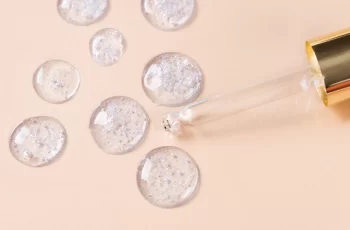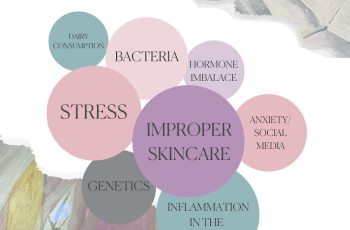What Does Hyaluronic Acid Do for Acne?
If you happen to be up to date with the beauty insiders blog, you would know just how much we love hyaluronic acid and its numerous benefits. If you are still a little unsure what hyaluronic acid is, you can check out the blog post all about the skincare benefits of hyaluronic acid which goes into a little more detail about what the powerhouse ingredient provides for the skin.
Hyaluronic acid is a naturally occurring compound found in the body, which generally means it is highly beneficial for all skin types and rarely causes any skin irritation. When applied topically on the skin the main function of hyaluronic acid is to attract moisture to the skin, this is due to the fact it is a humectant meaning it draws in water from the surrounding area and absorbs it into the skin. With its highly hydrating properties it is no wonder those with a dry skin type adore applying formula containing this ingredient. As for you oily and blemish prone skin types, hyaluronic can provide some skin benefits for you too, so let us find out more about this clever acid and what it can do for the skin and acne.
What does hyaluronic acid do for your skin?
Hyaluronic acid is a powerful and hydrating skin ingredient that can help restore the correct moisture levels in the skin’s microbiome. This in time leads to results such as plumper and firmer looking skin with fine line and wrinkles notably reduced. Extreme dryness, redness and dehydration to the skin benefit from the regularly application of hyaluronic acid, however the lesser known benefit of this acid is its anti-bacterial properties and ability to heal open wounds in rapid time. This will hugely help reduce any inflammation or flare up caused by breakouts and acne, especially if there are some spots that have broken the skin and caused other damage.
Is hyaluronic acid OK for acne prone skin?
As mentioned previously, hyaluronic acid naturally occurs in the skin and is not known to be irritating or cause any type of skin reaction. You may also find that adding hyaluronic acid to a skincare routine that is tailored to combating acne will in fact, help your complexion become clear and hydrated.
When using an acne battling skincare routine, you will find it frequently includes products containing salicylic acid, which has a reputation for sometimes making the skin very dry and tight. With the help of hyaluronic acid you are able to counteract any dryness or flaking of the skin and restore the moisture balance of the natural protective barrier. This in the long run will help any further breakout of acne as the barrier is fully functioning and has the ability to ward off any free radicals and other stresses that can penetrate the skin usually resulting in more spots and blemishes.
Is hyaluronic acid good for acne?
You will now understand why hyaluronic acid is OK to use for acne prone skin, but this does not mean there is no downside to using this hero acid. Though the main benefits of hyaluronic acid are its hydrating properties, if applied onto an extremely dry skin you may find the acid draws up the moisture from the lower layers resulting in the skin feeling tight and very uncomfortable.
Dryness of a normally oily and blemish prone skin can occur when a product formulated to target acne contains high levels of salicylic acid and other potent ingredients, particularly if these products are prescribed by a doctor or dermatologist. Over-use of exfoliants and other harsh ingredients can also result in the skin becoming stripped of any vital oil and water, this leads to cycle of the skin overproducing sebum (the natural oil found in your skin) to help restore balance which results in more spots and acne flare-ups. To avoid any further problems to the skin it is best to apply hyaluronic acid once a day, ideally in the morning, this should help hydrate the face without causing any further skin concerns.
Does hyaluronic acid help dark spots?
Dark spots are the result of damage caused in the lower layers of the skin and a overproduction of melanin, which is caused by skin damage from environmental aggressors and the lasting results of spots and blemishes being “popped.” You will find that the pigmentation of these dark spots increase with exposure to the sun and other free radical damage, such as pollution. Some ingredients, like vitamin C, are renown for combating signs of dark spots and acne scaring. Believe it or not hyaluronic acid is also praised for its pigmentation combating properties.
The skin naturally provides a cellular turnover which takes 28 days for new skin cells to make their way to the surface of the skin. This is helped hugely by applying hyaluronic acid to the skin, focusing on the areas suffering from post-acne pigmentation. Though it does not speed up the cell renewal, unlike other skin ingredients, such as AHAs and BHAs, it does help to promote cell regeneration by providing extra hydration to the skin and its protective barrier. This will then result in the complexion looking healthier and more vibrant with dark spots and acne scarring visibly reduced.
Does oily skin need hyaluronic acid?
Yes, it does! Oily skin still naturally has hyaluronic acid occurring in it, meaning it will highly benefit from the ingredient being applied topically to the skin. You should also consider the fact that all skin types can suffer from dehydration which can create signs of premature ageing such as fine lines and wrinkles to become more prominent. By applying hyaluronic acid to an oily skin you are helping it to remain hydrated and looking healthy with any blemishes or spots reduced. If you are having trouble trying to determine which skin type you are, check out our blog post about the 4 most common skin types.
There you have answers to some of the most popular questions about what hyaluronic acid do for acne. If you are wanting to know more we have a few more blog posts about how to treat acne and which are the best ingredients to use in a skincare routine when combating acne.
Don’t miss out on more skincare tips and expert advice over on our YouTube channel! Come and find us on The Green Sofa by hitting the subscribe button, you won’t regret it!


